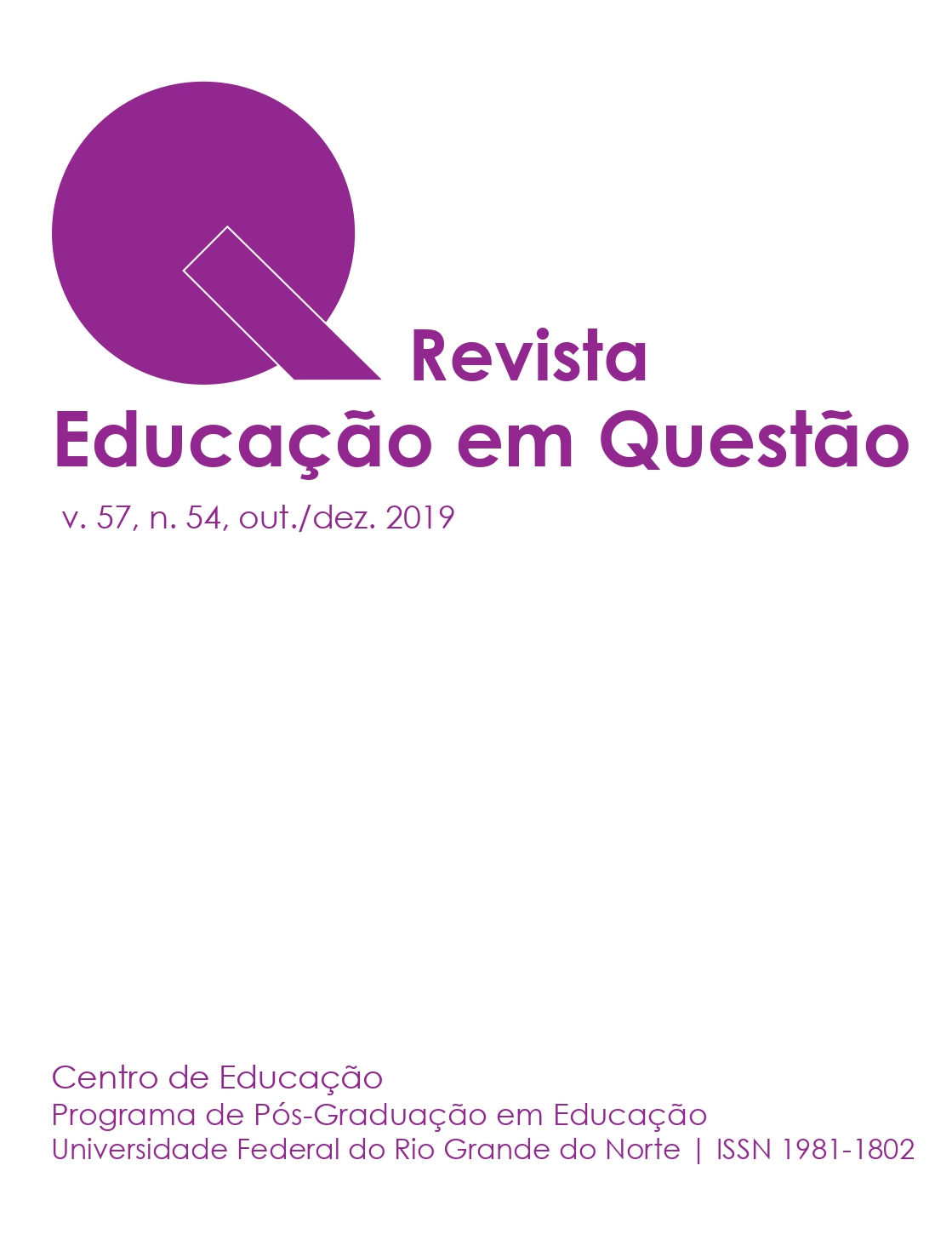Currículo y pensamiento epistemológico en la educación superior
DOI:
https://doi.org/10.21680/1981-1802.2019v57n54ID18569Palabras clave:
Educación Superior. Curriculum. Pensamiento Epistémico. Estudiantes.Resumen
Este artículo presenta un análisis teórico sobre las implicaciones de las configuraciones curriculares en el contexto de la educación superior, con el objetivo de elaborar un conjunto de proposiciones curriculares para el desarrollo del pensamiento epistémico de los estudiantes en cursos de pregrado. La fundamentación teórica se basa particularmente en los estudios de Perry (1970), Hofer (2001) y Schommer (1990). El desarrollo metodológico del trabajo se basa en el enfoque de investigación integradora, originalmente propuesto por Cooper (1984), que permite elaborar un conjunto de proposiciones teóricas a partir de un corpus de investigación sobre un tema determinado. El estudio comienza examinando el concepto de pensamiento epistemológico en el contexto de la educación superior. En seguida, elabora y analiza un conjunto de propuestas curriculares para apoyar el desarrollo del pensamiento epistémico de los estudiantes. Los resultados resaltan la importancia de que el currículo comprenda actividades que alienten a los estudiantes a explorar conceptos desde diferentes perspectivas y desarrollar un pensamiento independiente, que permita un aprendizaje abierto y basado en proyectos, que implique la construcción de argumentos y una evaluación abierta.
Descargas
Citas
AHOLA, Salla. Measurement issues in studying personal epistemology. Psychology & Society, online, v. 2, n. 2, p. 184–191, 2009. Disponível em : http://www.psychologyandsociety.org/__assets/__original/2009/11/Ahola.pdf. Acesso em: 10 ago. 2019.
BAUMAN, Zygmunt. Intimations of postmodernity. London: Routledge, 1992.
BAXTER MAGOLDA, Marcia. Students’ epistemologies and academic experiences: implications for pedagogy. The Review of Higher Education, Las Vegas, v. 15, n. 3, p. 265-287, Spring 1992.
BRATEN, Ivar. Personal epistemology, understanding of multiple texts, and learning within internet technologies. In: KHIN, Myint (ed.). Knowing, knowledge and beliefs: epistemological studies across diverse cultures. New York: Springer, 2008. p. 351-376.
BREM, Sara. K.; RUSSELL, Janet; WEEMS, Lisa. Science on the web: student evaluations of scientific arguments. Discourse Processes, Saint Joseph, v. 32, n. 2 e 3, p. 191-213, 2001.
COOPER, Harris. Integrating research. Newbury Park: Sage, 1984.
EDMONDSON, Katherine; NOVAK, Joseph. The interplay of scientific epistemological views, learning strategies, and attitudes of college students. Journal of Research in Science Teaching, Reston, v. 30, n. 6, p. 547–559, 1993.
GLASS, Anna. The state of higher education 2014. Paris: OECD, 2014.
HOFER, B. Personal epistemology research: implications for learning and teaching. Journal of Educational Psychology Review, online, v. 13, n. 4, p. 353-383, 2001. Disponível em: https://link.springer.com/article/10.1023/A%3A1011965830686. Acesso em: 10 ago. 2019.
HOFER, Barbara. Epistemological beliefs and first-year college students: motivation and cognition in different instructional contexts. In: ANNUAL MEETING OF THE AMERICAN PSYCHOLOGICAL ASSOCIATION - APA, 102., 1994, Los Angeles. Proceedings [...] Washington: APA, 1994. p. 1-25.
HOFER, Barbara; PINTRICH, Paul (ed.). Personal epistemology: the psychology of beliefs about knowledge and knowing. Mahwah: Erlbaum, 2002.
HOFER, Barbara; PINTRICH, Paul The development of epistemological theories: beliefs about knowledge and knowing and their relation to learning. Review of Educational Research, Washington, v. 67, n. 1, p. 88–140, 1997.
KING, Patricia; KITCHENER, Karen. Reflective judgment: theory and research on the development of epistemic assumptions through adulthood. Educational Psychologist, London, v. 39, p. 5–18, 2004.
KING, Patricia; KITCHENER, Karen. The development of reflective thinking in the college years: the mixed results. New Directions for Higher Education, San Francisco, n. 84, p. 25-42, Winter 1993.
MOORE, William. Student and faculty epistemology in the college classroom. In: PRICHARD, Keith; SAWYER, Mclaran (ed.). Handbook of college teaching: theory and applications. Westport: Greenwood Press, 1994. p. 45-76.
PALMER, Betsy; MARRA, Rose. College student epistemological perspectives across knowledge domains: a proposed grounded theory. The International Journal of Higher Education Research, Amsterdam, v. 47, p. 311–335, 2004.
PEDRA, José Alberto. Currículo e conhecimento: níveis de seleção do conteúdo. Em Aberto, v. 12, n. 58, p. 30-37, abr./jun. 1993.
PERRY, William. Cognitive and ethical growth: the making of meaning. In: CHICKERING, Arthur (ed.). The modern American college. San Francisco: Jossey-Bass, 1981. p. 76-116.
PERRY, William. Forms of intellectual and ethical development in the college years: A scheme. New York: Holt, Rinehart & Winston, 1970.
PERRY, William. Patterns of development in thought and values of students in a liberal arts college: a validation of a scheme. Cambridge: Harvard University Press, 1968.
PINAR, William. What is a curriculum theory? Mahwah: Lawrence Erlbaum, 2004.
RYAN, Michael. Monitoring text comprehension: individual differences in epistemological standards. Journal of Educational Psychology, Washington, v. 76, n. 2, p. 248-258, 1984.
SCARDAMALIA, Marlene; BEREITER, Carl. Knowledge building: theory, pedagogy, and technology. In: SAWYER, K. (Ed.). Cambridge handbook of the learning sciences. New York: Cambridge University Press, 2006. p. 97-118.
SCHOMMER, Marlene. Comparisons of beliefs about the nature of knowledge and learning among postsecondary students. Research in Higher Education, Ponte Vedra Beach, v. 34, p. 355-370, 1993.
SCHOMMER, Marlene. The effects of beliefs about the nature of knowledge on comprehension. Journal of Educational Psychology, Washington, v. 82, n. 3, p. 498-504, 1990.
SCHOMMER, Marlene. Student beliefs about the nature of knowledge: what are they and how do they affect comprehension. Urbana: Center for the Study of Reading, 1989.
SCHOMMER-AIKINSA, Marlene; EASTER, Marylin. Ways of knowing and epistemological beliefs: combined effect on academic performance. Educational Psychology, London, v. 26, n. 3, p. 411–423, June 2006.
SILVA, Tomaz. Tadeu da. Documentos de identidade: uma introdução a teoria dos currículos. Belo Horizonte: Autêntica, 1999.
YOUNG, Mark. Personal epistemological beliefs and their relationship to learning. Journal for Advancement of Marketing Education, online, v. 6, p. 63-76, Summer 2005. Disponível em: http://www.mmaglobal.org/publications/JAME/JAME-Issues/JAME-2005-Vol06-Issue1/JAME-2005-Vol06-Issue1-Young-pp63-76.pdf. Acesso em: 10 ago. 2019.
Descargas
Publicado
Cómo citar
Número
Sección
Licencia
A la Revista “Educación en Cuestión” se reservan los derechos de autor pertinentes a todos los artículos publicados en ella.
Los autores y coautores de artículos y reseñas, publicados en la Revista “Educación en Cuestión”, tendrán un plazo de, como mínimo, de 1 (uno) año para que puedan someter nuevos trabajos para publicación.






